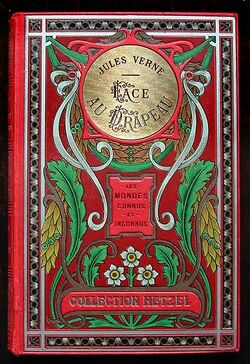Facing the Flag or For the Flag (French: Face au Drapeau) is a patriotic novel by Jules Verne first published in 1896. The book is part of the Voyages Extraordinaires (Extraordinary Voyages) series.
Like The Begum's Millions, which Verne published in 1879, it has the theme of France and the entire world threatened by a super-weapon (what would now be called a weapon of mass destruction) with the threat finally overcome through the force of French patriotism.
It can be considered one of the first books dealing with problems which were to become paramount half a century after its publication in World War II and the Cold War: brilliant scientists discovering new weapons of great destructive power, whose full utilization might literally destroy the world; the competition between superpowers to obtain overwhelming stockpiles of such weapons; and, efforts of other nations to join the nuclear club.
Lawsuit[]
Following publication of the book, Verne was sued by the chemist Eugène Turpin, inventor of the explosive Melinite, who recognized himself in the character of Roch and was not amused. Turpin had tried to sell his invention to the French government which in 1885 refused it, though later purchasing it (it was extensively used in the First World War); but Turpin had never gone mad, nor did he ever offer his invention to any but the Government of France, so he had some justified grievance. Verne was successfully defended by Raymond Poincaré, later president of France. A letter to Verne's brother Paul seems to suggest, however, that after all Turpin was indeed the model for Roch. The character of Roch and his revolutionary powerful explosive might also have been be inspired by the real-life Alfred Nobel who invented dynamite and later reportedly regretted having introduced such a destructive force into the world.
Politics[]
The book was written and published when France was in the throes of the Dreyfus Affair, Frenchmen were deeply divided over whether or not the Jewish officer Alfred Dreyfus was guilty of treason and espionage on behalf of the hated Germany (and over more fundamental issues bound up with the Dreyfus case). Verne is known to have initially supported the right-wing anti-Dreyfusards.
The question whether or not Verne was an anti-semite is hotly debated; while Walter A. McDougall finds "no overt evidence of anti-Semitism on Verne's part," Brian Taves and Jean-Michel Margot note that his Off on a Comet contains "unflattering Shylock-style stereotypes." Be that as it may, Verne certainly was a nationalist caught up in the mindset of revanchism, to whom the idea of a French army officer, Jewish or not, spying for Germany would be the greatest of anathemas; and initially Verne, like most French people, believed Dreyfus to be guilty. However, in 1899 Verne came to support a judicial review of the Dreyfus case.
While Roch cannot be said to represent Dreyfus in any concrete way, the theme of an apparent traitor, who in the end proves to be a self-sacrificing patriot, may be connected to the change of heart which Verne (and many readers) underwent about Dreyfus.
Analysis[]
"(...) In the terrible explosion which destroyed the island of Back Cup, Ker Karraje and his pirates have disappeared - and with them Thomas Roch and the secret of his invention" is how Verne ends his book. However, knowledge of Twentieth Century history and how it was effected by the discovery of Weapons of Mass Destruction could lead to doubt if that would be quite the end.
Under the conditions described, an accelerated arms race would have been virtually certain to break out between the various late 19th Century powers, each seeking to rediscover Roch's weapon for itself. Britain would presumably assert its sovereignty over Backcup to thoroughly comb the ruins for possible clues; the French would grill Hart for anything he might have picked up and search for any papers Roch may have left behind; the Americans would locate Karraje's suppliers and thoroughly examine their records; and as for the other powers, knowing that such a weapon is possible would be enough of a clue to try their utmost to duplicate it. One may well speculate that in the universe of Verne's book, the First World War would break out much sooner than 1914 and might be far more destructive.
Legacy[]
Film historian Thomas C. Renzi considers Roch the archetype of the "mad scientist," the thriller fiction stock character of a monomaniac whose warped genius endangers the world. If so, much of 20th-century thriller fiction, including such films as "Thunderball" and "Barbarella", may be considered direct descendants of "Facing the Flag".
In 1958, Czech director Karel Zeman used the novel as the basis for his 1958 film "Vynález zkázy" (a.k.a. "The Deadly Invention" and "The Fabulous World of Jules Verne"). The film, which made considerable use of the steel engravings in the original editions of Verne's novels, won the Grand Prix at the International Film Festival at Expo 58 in Brussels.
| This page uses Creative Commons Licensed content from Wikipedia (view authors). | 
|

